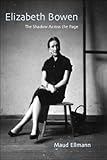Elizabeth Bowen : The Shadow Across the Page / Maud Ellmann.
Material type: TextPublisher: Edinburgh : Edinburgh University Press, [2022]Copyright date: ©2003Description: 1 online resource (256 p.)Content type:
TextPublisher: Edinburgh : Edinburgh University Press, [2022]Copyright date: ©2003Description: 1 online resource (256 p.)Content type: - 9780748617029
- 9781474497114
- online - DeGruyter
| Item type | Current library | Call number | URL | Status | Notes | Barcode | |
|---|---|---|---|---|---|---|---|
 eBook
eBook
|
Biblioteca "Angelicum" Pont. Univ. S.Tommaso d'Aquino Nuvola online | online - DeGruyter (Browse shelf(Opens below)) | Online access | Not for loan (Accesso limitato) | Accesso per gli utenti autorizzati / Access for authorized users | (dgr)9781474497114 |
Browsing Biblioteca "Angelicum" Pont. Univ. S.Tommaso d'Aquino shelves, Shelving location: Nuvola online Close shelf browser (Hides shelf browser)

|

|

|

|

|

|

|
||
| online - DeGruyter Introduction to the Qur'an / | online - DeGruyter Beyond New Age : Exploring Alternative Spirituality / | online - DeGruyter The History of Gothic Fiction / | online - DeGruyter Elizabeth Bowen : The Shadow Across the Page / | online - DeGruyter Transatlantic Modernism : Moral Dilemmas in Modernist Fiction / | online - DeGruyter Women's Writing of the Early Modern Period 1588-1688 : An Anthology / | online - DeGruyter Wood Quay : The Clash over Dublin's Viking Past / |
Frontmatter -- Contents -- Acknowledgements -- Abbreviations -- Preface -- Chronology -- Chapter 1 Shadowing Elizabeth Bowen -- Chapter 2 Fall: Bowen's Court and The Last September -- Chapter 3 Impasse: The Hotel, Friends and Relations, and ‘The Shadowy Third’ -- Chapter 4 Transport: To the North and The House in Paris -- Chapter 5 Furniture: The Death of the Heart, The Heat of the Day, and Wartime Stories 128 -- Chapter 6 Incubism: A World of Love and The Little Girls -- Chapter 7 Folly: Eva Trout -- Selected Bibliography -- Index
restricted access online access with authorization star
http://purl.org/coar/access_right/c_16ec
GBS_insertPreviewButtonPopup('ISBN:9780748617036);WINNER of the British Academy's Rose Mary Crawshay Literary PrizeThis study reveales both the pleasures offered by Elizabeth Bowen's works to the general reader and the literary critic, theorist and historian.Elizabeth Bowen was one of the finest writers of fiction in English in the twentieth century and one of the strangest. Born in 1899, her historical vision extends from the Irish Troubles of the 1920s to the London Blitz and the technological revolution of the post-war years. Her fiction is always entertaining – funny, moving and full of suspense – but it is also profoundly disconcerting.Maud Ellmann teases out Bowen's strangeness through close readings informed by historical, psychoanalytic and deconstructive methods of interpretation. She contextualises Bowen's work in the Irish and modernist traditions to investigate connections between her life and writing. She thoroughly expores Bowen's conflicting and complicit relations with other Irish, British, and European writers, her negotiations between contemporary history and with the long decline of the Anglo-Irish Protestant ascendancy, her peculiar take on gender and sexuality, her hallucinatory treatment of objects, particularly furniture and telephones and the surprising ways in which her writing pre-empts and in some cases confounds the literary theories brought to bear upon it. Bowen's writing is demonstrated to reach from a Dickensian comprehensiveness to an uncanny premonition of postmodernism."
Mode of access: Internet via World Wide Web.
In English.
Description based on online resource; title from PDF title page (publisher's Web site, viewed 29. Jun 2022)


